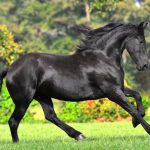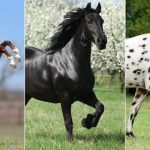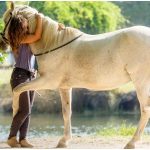Can horses see in the dark? Yes, horses can see in the dark. They have dichromatic vision, meaning they can see two colours: blue and yellow.
In low light conditions, their eyes are able to adjust quickly by increasing the size of the pupil to help gather more light.
This allows them to detect movement and recognize shapes even in near-darkness. Additionally, horses possess a tapetum lucidum layer, which is located behind the retina and reflects light through it again, causing images to appear brighter than normal so that they can better identify objects in dim lighting or darkness.
Horses possess a remarkable ability to see in the dark, which is known scientifically as “scotopic vision.”
With their large eyes and wide retinas, horses have more rods than cones — meaning they are much better equipped for night-time visibility than humans. This makes them excellent animals for activities like trail rides or nighttime events such as fox hunting.
Additionally, horses can detect motion and distinguish between colours even in low light conditions; they may not be able to make out all the details that we can during the day but can still easily find their way around without bumping into things in darkness!

Credit: horsetoloan.com
Training Horses for Better Night Vision
While horses naturally possess decent night vision, there are ways to train them to improve their low-light capabilities even further.
Exposing horses gradually to lower light conditions allows their eyes to adapt over time. Start by dimming barn lights or turning some off periodically so they learn to adjust.
Lunge or ride in a covered arena as the sun sets so the horse becomes comfortable in fading light. Reward calm behaviour to build confidence. With time, most horses can learn to be more sure-footed and less anxious in darkness.
Providing Lighting and Reflective Gear for Night Riding
To maximize safety when riding horses at night, provide ample lighting around the barn and arena and use reflective gear. Install motion-sensor lights on barns and arenas to ensure visibility when retrieving or tacking up horses.
Equip your horse with reflective leg wraps, tail ribbons, and a lighted breast collar or bridle. For the rider, wear a reflective safety vest, flashlight or headlamp, and attach lights to saddlebags. Taking these precautions will alert motorists, prevent injuries, and give the horse visual guides to follow on the trail.
Feeding Considerations for Horses Kept in Dark Stalls
For horses stalled overnight without light, consider adjusting feeding schedules to match natural rhythms. Since horses are diurnal animals who eat during daylight hours, feeding too late into dusk or at night goes against their instincts. Instead, provide the bulk of hay and feed as late in the afternoon before dark.
Smaller meals can be given in the early morning before sunrise. This helps prevent ulcers and mimics natural grazing patterns for horses in darker stalls.
Can Horses See in Total Darkness?
Horses are remarkable animals and possess many incredible abilities, including seeing in the dark. But can horses see in total darkness? The answer is both yes and no.
While horses have better night vision than humans, they do not possess perfect night vision that allows them to see in complete darkness.
Horses’ eyes are adapted for seeing in low light more effectively than human eyes; their pupils are much larger, which allows more light into the eye, and their retinas contain more rods which help gather any available light particles around them.
This means that when there is no artificial or natural source of light, such as during a power outage or on a moonless night, horses will be unable to detect objects around them.
However, if there is even the slightest amount of ambient lighting – from streetlights or stars – then horses can use it to make out shapes and shadows within their surroundings.
How Does a Horse See at Night?
Horses, like humans, have eyes that are adapted to seeing in the dark. However, their night vision is much better than ours because they have an extra layer of cells called rods in their eyes that help them see in dim light.
These rods allow horses to pick up more light and distinguish details even when it’s dark outside.
This is why you may notice your horse looking around at night when there’s very little moonlight or starlight – they can still “see” what’s going on!
Horses also have a wide field of view, which means they can spot movement from far away, and any sudden noises will catch their attention, too. They also tend to be less sensitive to bright lights, so if you take them out late at night, make sure you keep flashlights off as it may startle them.
All these advantages mean horses can easily travel through darkness with ease and confidence- something we humans would do well to learn from!
How Do Horses See Humans?
Horses are incredibly able to understand the world around them, including humans. Horses are capable of forming strong bonds with their human owners, and they can recognize individual people by sight. They also use a combination of visual cues and body language to communicate with us.
In terms of vision, horses possess different characteristics than humans do. Most notably, horses have binocular vision, which means that they can view two separate images at once – one from each eye – allowing them to sense depth and distance in their surroundings more easily than we do.
Additionally, horses possess much larger eyes than humans; this allows them to see better in low-light conditions but decreases their ability to focus on small objects or distinguish between colours as well as we can.
Although horses may not be able to interpret our words like a dog might, research suggests that they interpret facial expressions just as well as any other animal does!
All these factors combined help explain why your horse is so good at understanding you — even if it doesn’t always seem like it!
Do Horses Like the Dark?
Horses are highly sensitive creatures, and many can be quite fearful. Many horses may not like the dark because they cannot see as well in it as in the light. This can cause anxiety and stress for some horses, making them uncomfortable when left in a dark area or stall overnight.
While some more confident and relaxed horses may have no problem with being kept in darkness, most will feel uneasy if this is done without proper preparation.
To help make your horse more comfortable at night, you should introduce him to the dark gradually by introducing dim lighting into his environment prior to turning off all lights completely or closing doors/blinds that block out natural light sources.
Additionally, providing your horse with plenty of mental stimulation throughout the day will help keep him calm during nighttime so he doesn’t become too anxious while alone in a darkened space.
Can a Horse See in the Dark?
Conclusion
This blog post has shown that horses do have some degree of night vision, although it is not as good as that of humans. Horses can adjust to low light conditions better than humans and see objects in the dark but cannot discern colour or fine details.
Therefore, it is important for riders to take extra precautions when riding at night and make sure their horse can see where they are going.
With a little bit of planning and preparation, both rider and horse can safely enjoy nighttime rides.
Janet G Kulick is an experienced horse rider, trainer, and owner of the informative horse blog, Horseray.com. Her engaging writing style and wealth of knowledge on horse care, riding, and training make her a trusted source for horse enthusiasts worldwide.






